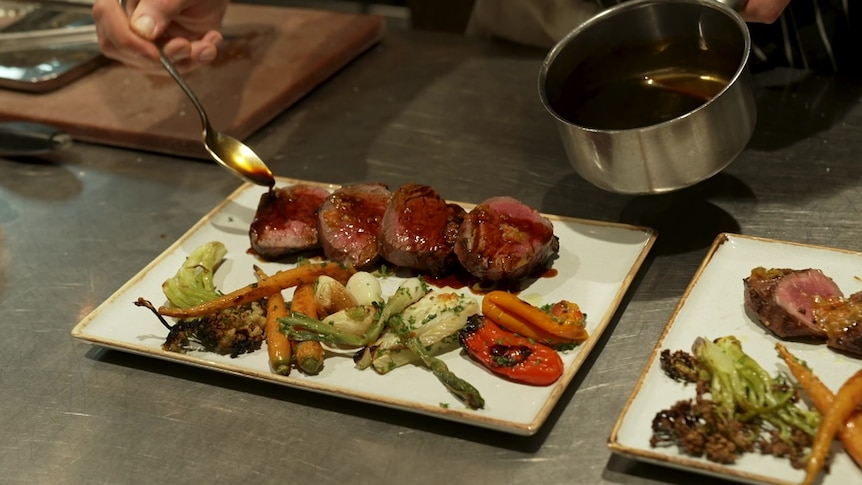A study shows Australians would rather take other actions to help the environment than give up meat.
Participants cite a lack of vegetarian options when dining out, despite Australia having more than ever, as a barrier to the diet.
Researchers hope the study will highlight reasons behind people’s reluctance to reduce meat consumption.
Most people aren’t going to voluntarily do anything that drastically changes their life. Big fuckin surprise.
Honestly I wouldn’t consider this a drastic change to life considering how easy it is to do lmao. My best friend/roommate is vegan while I’m a meat eater. Wherenever she’s home at dinner time I’ll cook for both of and make sure it’s something we can both eat so it’s more often than not vegan meals. You know what’s happened since? I’ve just gotten noticeably healthier lmao. I’ll still eat meat on occasion (more often than not poultry), but if I never had it for the rest of my life I honestly wouldn’t mind much.
Drastically change their life? Not buying meat is pretty drastic. Where do you even begin? Buy meat and throw it away? Help
This is such a bullshit response. There are plenty of vegetarian options when eating out in Australia. And the more vegetarians there are, the more options restaurants will offer.
City? Yeah, if you pay a fair whack or live near one of the buddhist or hindu country diaspora hubs. Out bush? Yeah, nah. There will be one menu item, maybe two if you include the garden salad as being a meal.
One of the few vegetarian meals I’ve been able to have back home is “& chips”
Sometimes we make it fancy and have potato cakes too, but there are only so many ways you can deep fry a potato before throwing up
Yeah that’s true. I’m a city dweller and spoilt for choice. But I reckon if more people were asking for it out bush, the restaurants would update their menus.
Also depends on the city I imagine. I now describe myself as an “omnivore who prefers to not eat the animals” due to desperate times when going out…
Depends what you even call “city” really. Even in the most populated capital, things can get really dire in the outer suburban sprawl. Especially if they’re mostly Anglo-european suburbs. Your choices start to be mostly “vegetarian burger using frozen gross patties” at the local bowling club or “pre-frozen falafel kebab”. And the “don’t add meat” option at the ubiquitous Chinese and Thai joints.
I guess it varies. There are vegetarian options at a lot of places, but I often find it’s only one or two options.
It really depends on the venue of course. Some of my favourite places have tons of options, but most of my friends aren’t interested in those. It also gets even harder when the few vegetarian options are often ruled out for you due to other dietary restrictions…
That’s exactly what bullet point 2 is saying.
Stop having children if you’re that worried about it.
I’m doing my part!
Yes, let’s not make life sustainable for future generations, let’s… not have future generations at all?? What kind of logic is that
God forbid I have 1 kid instead of 3. There is an in-between.
Solid. Solid logic.
Haha. That wasn’t one of the options they gave. Nor was “Don’t have a dog or cat”
A study shows Australians would rather take other actions to help the environment than give up meat.
So exactly the same as polling on alternatives to the Voice. Australians want vague solutions to problems they pretend to care about, but when you propose actual solutions: crickets.
The list of options participants were given:
- Eat less meat (50% reduction)
- Stop eating meat
- Avoid food products imported by plane
- Use public transport
- Recycle things more
- Buy fewer new things
- More energy from renewable sources
Some of it is a bit less actionable then “eat less meat”, but they’re still pretty concrete.
Nothing short of totally abolishing the capitalist mode of production can be taken remotely seriously.
And that one certainly isn’t serious
i wonder how quickly capitalism would fall if every liberal who pretended to be against it but tut-tutted the idea of it being overthrown would just shut the fuck up
Whose pretending to be against it? I’m for tighly regulated capitalism, coupled with some public ownership of natural monopolies.
so you’re against capitalism
Regulated capitalism is still capitalism
It must be nice and simple to see the whole world in black and white terms. You should definitely try getting to grips with nuance though. It makes things annoyingly complicated and messy, but is ultimately rewarding.
I wouldn’t hold my breath
The willingness seems pretty low on everything but “renewable sources” and recycling which requires the least effort from people.
There being some willingness to reduce meat is nice, but I’ve heard that line before (people rarely follow through in practice).
I guess there’s going to be some interpretation about what a high vs low result really is (like how a 6/10 rated game or movie is “low”). I personally thought the raw results would have been lower based on some of the doomposting elsewhere in the thread.
I have already done all these except #2. And yes - I mean that. I have changed my lifestyle over the past 10-15 years doing these things consciously.
But the voice was the vague “solution” to the problem - that was the problem.
Australia was and, despite the best efforts of the Yes campaign, continues to remain and egalitarian liberal democracy.
A very thick ribeye, cooked 5 mins each side then the ends.
A lamb rack, perfectly roasted in the oven.
Pork belly, crackling, Asian style.
Bacon.
Thanks for your valuable contribution to !environment@aussie.zone 🫠
This is what AI commenting will look like in the future (or perhaps the future is already here). It will detect the topic of the discussion and add descriptions of the top 4 images it picks up on Google.
Sometimes it’ll seem sort of relevant if you try really hard to make sense of it, but usually it’s just gonna read like the above comment
I’m training AI well.
(I’m not a bot)
That’s exactly what an AI bot would say… 🤔
Are you an annoying bot or an annoying human?
Human?
 Muh le epic bacon
Muh le epic bacon 
Salt and pepper, 2 minutes each side for the good grill marks, down the hatch.
Seems like we made them mad.
Jealous cunts wish they ate meat
They’ve probably never had elk, so they don’t know how good meat can taste.
Ok, and?
Lol lmao. Everyone who is like “I’d give up meat if only there were more options at restaurants” should immediately give it up except at restaurants where there are no meatless options in order to fulfill their own stated values.
Of course, my bet is it’s just a rationalisation. Our culture sucks and people are always looking for some reason why doing the bare minimum is unreasonable.
Participants cite a lack of vegetarian options when dining out
Well it’s not a religion. Eat meat if you don’t find anything else on the menu. Avoid it when cooking yourself. But it’s not about that, people are addicted to meat and don’t want to reduce their consumption.
We’re not “addicted to eating meat”, we just enjoy eating meat. It’s good for us and it tastes good and it’s easy to get.
meat is good for you?!?!?! literally the only POSSIBLY half decent meat is fish and i know that’s not what you’re talking about.
you’re that fent addict i knew who said that opiates were necessary for dopamine levels
Yes, meat is good for you. It’s full of nutrients that are good for you. It’s the best source of many vital things. We have teeth made for eating meat. That’s not a coincidence.
I killed this thread derail: it is not contributing to the discussion and has devolved into name-calling.
Reddit
If you are saying my actions are comparable to Reddit, there are differences:
- I am transparent about it and my reasoning for it. It’s not some faceless, anonymous person censoring discussion.
- You can go to aussie.zone and click on the modlog. You can see the original messages if you really want. Again, transparent.
So it’s not really like Reddit at all.
Yeah I disagree with any Reddit comparison here. This is good moderation. I say this as one of the posters that has comments deleted. If this was like Reddit whoever the mod disagreed with would be permanently banned.
Sure sure
Our teeth are made for eating fruit and mashing uncooked yams into something we could digest. Jesus Christ.
Steak has less nutritional density than quinoa, lentils, broccoli, spinach, carrots, and at that point I just gave up and asked GPT4, which said this:
In a general sense, the vast majority of commonly eaten vegetables and legumes would be considered more nutrient-dense than steak when evaluating the full spectrum of nutrients relative to calorie content. If we’re assessing nutrient density across a range of vitamins, minerals, and fiber, likely over 90% of vegetables and legumes would have a higher nutrient density than steak, due to their low-calorie content and rich array of nutrients. However, specific comparisons always depend on which nutrients you prioritize.
And
If we take whole grains such as brown rice, quinoa, barley, and oats, they are generally more nutrient-dense in terms of vitamins and minerals per calorie compared to steak, especially when considering their fiber content and variety of micronutrients.
TLDR: fuck no
Removed by mod
- Reduced Exposure to Antibiotics and Hormones: By avoiding meat, a vegan diet reduces exposure to antibiotics and hormones often used in animal farming.
- Lower Risk of Certain Autoimmune Diseases: A plant-based diet may reduce the risk of certain autoimmune diseases like rheumatoid arthritis.
- Gut Microbiome Diversity: A high intake of plant-based foods can lead to a more diverse and health-promoting gut microbiota.
- Reduced Risk of Gallstones and Gallbladder Disease: Diets high in fiber and healthy fats, and low in cholesterol, may reduce the risk of gallstones.
- Lower Levels of Toxic Compounds in the Body: Vegan diets may lead to lower levels of harmful chemicals like PCBs and dioxins that accumulate in the fat of animals.
- Potential Reduction in the Risk of Alzheimer’s Disease: Some studies suggest that diets rich in fruits, vegetables, grains, and nuts, with an emphasis on antioxidant and nutrient-rich foods, may lower the risk of Alzheimer’s disease and other forms of dementia.
- Improved Sleep Quality: Diet plays a role in sleep regulation, and some plant-based foods contain natural compounds that may promote better sleep.
- Reduced Risk of Foodborne Illnesses: Plant-based diets may carry a lower risk of bacterial foodborne illnesses, especially those related to meat consumption.
- Hormone-Free Eating: Plant-based diets avoid the hormones found in animal products, which can have various health effects.
- Lower Risk of Hormone-Related Cancers: Diets high in animal products have been linked to certain hormone-related cancers, such as breast and prostate cancer, which may be less common in those following a vegan diet.
- Potential for Improved Athletic Performance: Some athletes report improved recovery times and performance due to the anti-inflammatory effects of a plant-based diet.
- Mitigation of Secondary Dietary Risks: By avoiding fish, a vegan diet also avoids the risk of mercury exposure, which is a concern with certain types of seafood.
TLDR: Fuck no
Removed by mod
you were literally talking about nutrition!!!
here, I asked GPT for a list of health benefits of veganism:
A well-balanced vegan diet that includes essential nutrients such as Vitamin B12 and DHA (docosahexaenoic acid, an omega-3 fatty acid) can offer a range of long-term health benefits. Here is a list of potential benefits based on scientific research and nutritional studies:
- Heart Health: Vegan diets are typically rich in heart-healthy nutrients. They are high in dietary fiber and antioxidants, and low in saturated fats, which can help reduce the risk of heart disease.
- Weight Management: Plant-based diets are often lower in calories and can help in weight management and reduce the risk of obesity.
- Diabetes Prevention and Management: A vegan diet can help in the prevention and management of diabetes by improving insulin sensitivity and reducing blood sugar levels.
- Cancer Risk Reduction: Some studies suggest that a vegan diet may reduce the risk of certain types of cancer, such as colon cancer, due to high levels of dietary fiber, vitamins, and phytochemicals.
- Improved Digestive Health: High fiber intake from a vegan diet supports digestive health and can help prevent constipation and diverticular disease.
- Lower Blood Pressure: Plant-based diets can contribute to lower blood pressure due to their low sodium and high potassium content.
- Reduced Risk of Stroke: Some evidence suggests that a higher intake of fruits and vegetables associated with a vegan diet can reduce the risk of stroke.
- Improved Cholesterol Levels: Vegan diets can improve cholesterol levels, reducing LDL (bad cholesterol) and increasing HDL (good cholesterol).
- Cognitive Health: Adequate levels of DHA are important for brain health. Including DHA from algae sources can help maintain cognitive function.
- Bone Health: With proper attention to calcium and vitamin D intake, a vegan diet can support bone health.
- Longevity: Some studies have linked vegan diets with a longer lifespan, possibly due to the reduced risk of chronic diseases.
- Reduced Inflammation: Plant-based diets can have anti-inflammatory properties.
- Improved Skin Health: A diet high in fruits and vegetables can improve skin health due to the high content of vitamins and antioxidants.
- Allergy Relief: Some individuals report relief from allergies when adopting a vegan diet, possibly due to the elimination of certain animal-based allergens.
- Environmental Benefits: While not a direct health benefit, the environmental advantages of a vegan diet contribute to overall wellbeing by promoting a sustainable and healthy planet.
- Improved Kidney Function: A plant-based diet may help slow the progression of chronic kidney disease and improve kidney function.
- Eye Health: Nutrients like vitamins C and E, found in a vegan diet, can support eye health and reduce the risk of cataracts and macular degeneration.
- Enhanced Mood: Some studies suggest that the consumption of fruits and vegetables has been associated with improved mood and mental well-being.
- Hormonal Balance: Plant-based diets can help in maintaining a balanced level of hormones in the body.
continued in second comment, because there were too many benefits to fit in 5000 characters
Removed by mod
If a vegan diet is well-planned and includes necessary supplements like B12 and DHA, it can offer health benefits such as a reduced risk of heart disease, certain cancers, obesity, and type 2 diabetes compared to typical Western diets that are high in processed meat and saturated fat. These benefits are significant and supported by a substantial body of research.
DHA is the omega 3 found in fish, FYI
Vegetarian diet to help planet
Cows are famously super good for the planet
Not eating the cows to instead only cultivate them on a smaller scale, for milk, is still better though.
Wait. You think Australians will take action. Hahahahaha
If you believe the study enough to mock the outcome, then yes, apparently they’ll take other actions:
“They are very happy to get more energy from renewable resources, to recycle things more, to buy fewer new things — which all do have an impact.”
will this come off our Kyoto credits?
I know you’re joking, but thankfully they were done away with: https://www.aapnews.com.au/news/australia-permanently-cancels-kyoto-carryover-credits (not the best source but the most important part is at the start)
This is the best summary I could come up with:
Australians love eating meat and say limited vegetarian options when dining out is a key barrier to changing their diet, despite more meat-free choices than ever, new research has found.
The report found respondents, who were aged between 18 and 84, believed reducing and eliminating meat intake were ineffective ways to address climate change.
“Although past research has shown that animal agriculture contributes significantly to greenhouse gas emissions, our participants believed reducing and eliminating meat intake to be some of the least effective actions against climate change,” co-author and provisional psychologist from La Trobe University Ashley Rattenbury said.
Two thirds of the La Trobe University study participants said having limited options when eating out was a barrier to adopting a vegetarian diet.
The La Trobe research was compared to a similar study conducted in 2003 by Emma Lea and Anthony Worsley, from Deakin University, which asked hundreds of Australians for their beliefs about barriers and benefits to vegetarianism.
The La Trobe University study also asked participants about their perceptions of the effectiveness of stopping or reducing meat consumption, compared to how willing they would be to engage in other actions that benefited the environment.
The original article contains 429 words, the summary contains 189 words. Saved 56%. I’m a bot and I’m open source!












